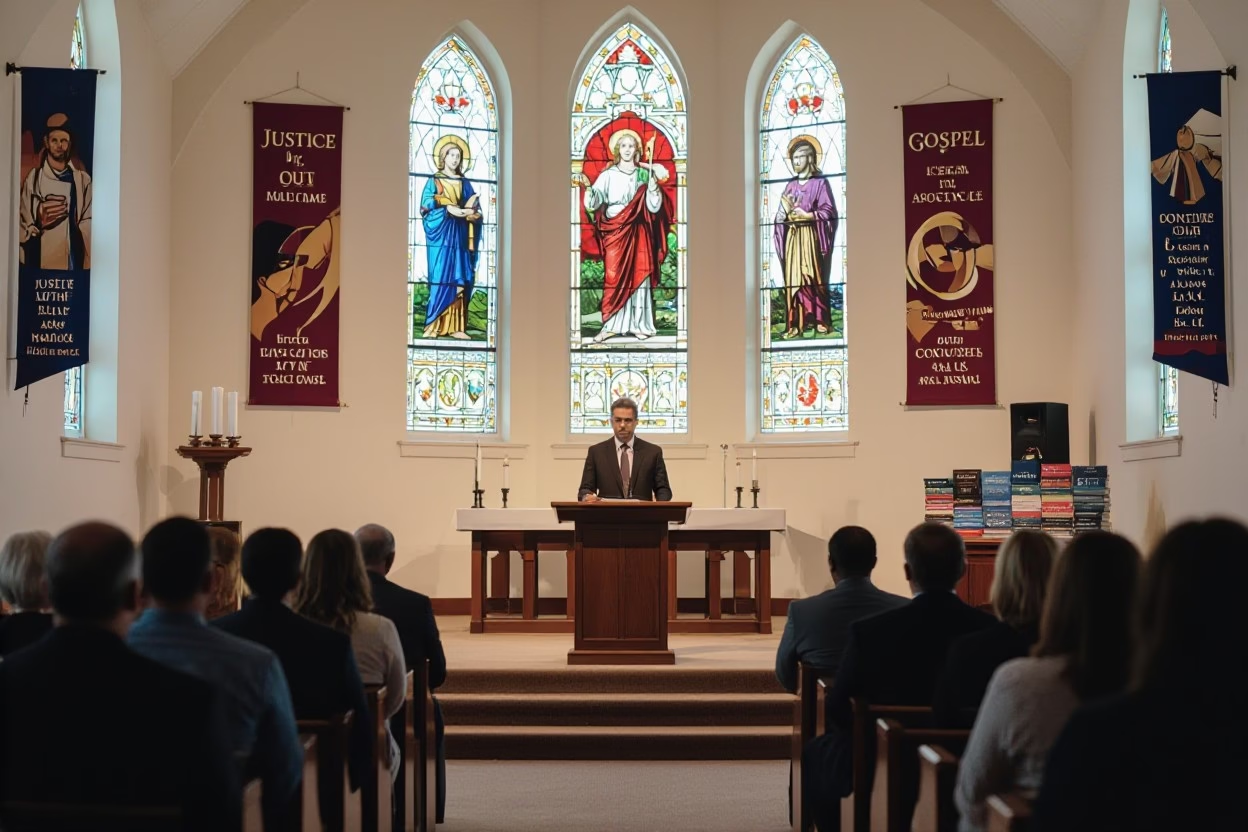Many Christians today recognize that caring for creation is not a peripheral concern but a foundational aspect of their faith. Rooted deeply in Scripture and tradition, they understand stewardship as a divine mandate that calls for both environmental justice and sustainable practices amid a worsening climate crisis. While some have misinterpreted biblical dominion as permission to exploit nature, contemporary theology emphasizes servant leadership and holistic care as expressions of embodied faith. They engage actively in worship, advocacy, and community efforts, affirming hope through creation’s renewal rather than escapism.

Key Takeaways:
- Christian theology of creation care is deeply rooted in Scripture, highlighting humanity’s divine mandate to steward—not exploit—the earth (Genesis 1–2).
- The concept of dominion in Genesis calls for servant leadership reflecting God’s care, countering historical misinterpretations that justified environmental harm.
- The Bible presents creation as intrinsically valuable, owned by God, and actively praising Him, inviting believers to honor creation through worship and stewardship (Psalms).
- Environmental degradation is intertwined with spiritual brokenness, as creation itself “groans” under human sin, emphasizing the need for holistic redemption (Romans 8).
- Christian hope looks forward to the renewal of all creation, motivating present-day action rather than passive escape, grounded in eschatological promises (Revelation 21).
- Environmental justice is integral to creation care, addressing disproportionate impacts on marginalized communities and fulfilling Scripture’s call to do justice (Micah 6:8).
- Practical expressions of embodied faith include sustainable church practices, family discipleship in environmental care, advocacy for policy change, and community engagement.
Scriptural Cornerstones of Creation Theology
Genesis as the Foundation of Stewardship
God’s declaration that creation is “very good” (Genesis 1:31) sets the tone for humanity’s role as caretakers rather than exploiters. Genesis 2:15 explicitly charges humanity to “work it and take care of it,” framing stewardship as a divine mandate rather than a privilege or optional task. This foundational text emphasizes that humans are entrusted with creation’s wellbeing, calling for responsible, sustainable engagement that honors God’s intentional design.
Psalms: The Earth’s Praise and Divine Ownership
The Psalms affirm God’s absolute ownership over creation with verses like “The earth is the Lord’s” (Psalm 24:1), while simultaneously portraying creation itself as an active participant in praising its Creator (Psalm 19:1–4). This dual emphasis highlights both the sacredness of the natural world and its inherent value beyond human utility.
Psalm 19:1–4 illustrates how the heavens declare God’s glory continuously and universally, transcending cultural and linguistic boundaries. This poetic testimony insists that nature is not silent but vocal in worship, thus assigning intrinsic worth to all created things. Moreover, Psalm 24:1 situates the earth within God’s sovereign domain, challenging any human claim of ultimate ownership and reinforcing stewardship as faithful custodianship under divine authority. These Psalms foster a theology that intertwines worship with environmental care, urging believers to recognize creation as a sacred trust and active worshiper.
Romans 8: The Groaning Creation
Paul’s vision in Romans 8 frames creation as “groaning” in anticipation of liberation alongside humanity (Romans 8:19–22). This profound image reveals creation’s suffering under human sin and its shared destiny with human redemption, linking environmental degradation to a spiritual crisis that demands integrated healing and restoration.
Romans 8’s depiction challenges fragmented views by placing creation firmly within God’s redemptive narrative. The “groaning” highlights not only environmental decay but also the ethical responsibility Christians bear to alleviate this distress. This passage invites believers to see ecological care as inseparable from spiritual renewal, underscoring the unity of all life under Christ’s transformative promise. The shared hope for future redemption mobilizes Christian engagement with ecological justice as an crucial expression of faith.
Revelation: Renewal of All Things
The vision in Revelation 21 ushers in the hope of a “new heaven and a new earth,” portraying not destruction but the ultimate renewal of creation. Christian eschatology envisions this restoration as inclusive of all creation, motivating present stewardship rooted in hope rather than escapism.
Revelation’s eschatological promise reframes the climate crisis within the broader biblical narrative of renewal, ensuring that care for the environment aligns with the hope of God’s comprehensive restoration. This vision resists any theology that dismisses creation as temporary or disposable; instead, it grounds Christian environmental action in the certainty that God’s redemptive work culminates in a resurrected, flourishing creation. Such hope galvanizes both patient perseverance and urgent activism amid ecological challenges.
Rethinking Dominion: From Exploitation to Responsibility
The Misinterpretation of “Dominion” in Genesis
The phrase “have dominion” in Genesis 1:28 has often been misconstrued as a divine permit to exploit nature unchecked. Such readings ignore the Genesis 2:15 mandate where humanity is tasked to “work it and take care of it.” Dominion, biblically, implies responsible stewardship rather than domination or conquest. This distinction is vital because misinterpretations have justified environmental degradation under the guise of theological sanction, exacerbating ecological harm instead of fostering care aligned with God’s intentions.
The Paradigm Shift Toward Servant Stewardship
Emerging theological reflections have redefined dominion as servant stewardship, emphasizing humility, service, and protection over domination. This shift positions humanity as caretakers who reflect God’s own nurturing character, responsible for sustaining creation’s flourishing rather than exhausting it for selfish ends.
Scholars and faith leaders increasingly highlight this servant stewardship paradigm by referencing Jesus’ model of servant leadership. For example, theologians stress that dominion aligns with loving care and sacrificial service, mirroring God who sustains all life (Psalm 104). Initiatives like creation-centered liturgies and church sustainability programs exemplify how congregations embody this stewardship ethic, fostering ecological renewal instead of exploitation. Such a framework broadens theological ethics to embrace environmental justice as intrinsic to faithful witness amidst the climate crisis.
Historical Missteps and the Call for Correction
Historic Christian approaches often devalued the material world, treating creation as a disposable stage for spiritual salvation. This led to neglect of ecological responsibilities and contributed to neglectful stewardship practices, reflecting a dualistic worldview that separated spirit and matter. Recent scholarship calls this a theological error with damaging consequences.
The legacy of dualism and anthropocentrism contributed to centuries of environmental neglect, allowing systemic exploitation to flourish unchecked. Early church figures like Augustine and Irenaeus challenged this by emphasizing God’s revelation through creation, but their insights were overshadowed in much of later history. Contemporary voices now invoke these patristic perspectives to reclaim an integrative theology, where care for the earth aligns with care for human flourishing. This corrective movement insists that environmental neglect equates to sin, demanding repentance and renewed commitment to creation care as obedience to God’s commands.
The Historical Trajectory of Creation Care in Christianity
Ancients to Medieval: Early Voices and the Nature of God
Early Christian thinkers such as Irenaeus and Augustine emphasized creation as a revelation of God’s character, affirming the intrinsic goodness and sacredness of the natural world. Irenaeus argued that creation reflects divine wisdom, while Augustine spoke of stewardship in light of humanity’s place within the broader created order. Their writings laid foundational theological principles opposing the later dualistic divide that devalued the material world, insisting that care for creation is an expression of faithful discipleship rooted in God’s ongoing self-disclosure through nature.
The Enlightenment and the Disconnection from Creation
The Enlightenment imprinted a worldview that often severed humanity from creation, promoting mechanistic science and human autonomy while marginalizing the sacredness of the natural world. With an emphasis on reason and control, nature became a resource to be mastered, leading to a pervasive theological and cultural amnesia about stewardship. This era’s dualistic thinking—spirit elevated, matter degraded—helped justify exploitative attitudes, fostering widespread neglect of creation within Christian praxis that contributed to environmental degradation.
Philosophers like Descartes and Locke framed the natural world as inert “matter” to be governed by human reason, undermining relational and sacred understandings embedded in earlier theology. The emerging industrial age accelerated this view, exploiting resources without ecclesial critique, while many churches prioritized salvation and soul care over ecological responsibility. Scientific advancements ironically distanced people from a sense of divine presence in creation, weakening the link between faith and environmental care—a fracture that contemporary Christian environmentalism seeks to heal by reintegrating biblical stewardship with holistic creation theology.
The Reawakening: Modern Movements for Environmental Stewardship
Since the mid-20th century, Christian communities have increasingly reclaimed creation care as indispensable to faithful living, responding to ecological crises through renewed theological reflection and activism. Movements like Green Christianity and faith-rooted environmental organizations have emerged, emphasizing justice, sustainability, and discipleship. Theological voices now emphasize repentance and repair, integrating ancient scriptural mandates with contemporary science and social justice concerns, thus modeling embodied faith that confronts climate change and environmental racism.
Leaders such as Pope Francis with his 2015 encyclical Laudato Si’, and grassroots initiatives across denominations, illustrate a robust resurgence of creation care as integral to the gospel. Churches have adopted sustainable practices, education programs, and advocacy for vulnerable communities disproportionately impacted by environmental harms. This movement restores stewardship as a non-negotiable aspect of Christian witness, drawing on Scripture and tradition to foster ecological renewal alongside social justice commitments, thereby bridging inherited neglect with active hope.
Urgency of the Climate Crisis: A Faithful Response
The Scientific Consensus and its Implications
More than 97% of climate scientists agree that human activities are driving accelerating global warming, with impacts such as rising sea levels, extreme weather, and biodiversity loss already manifesting worldwide. This overwhelming consensus challenges the church to move beyond debate and toward action. A faithful response acknowledges these facts as part of God’s created order groaning under human sin, compelling believers to adopt sustainable lifestyles and advocate for systemic change to protect vulnerable communities and future generations.
Humility and Repentance: A Theological Framework for Action
Recognizing environmental degradation as a spiritual brokenness calls for humility and repentance before God. This framework urges believers to confess complicity in exploitative systems and realign with the biblical mandate for servant stewardship. Through humble acknowledgment of past failures, the church can embrace restorative practices that heal both people and planet, embodying repentance not only in words but in sustained, faithful action.
The biblical narrative speaks of creation’s suffering alongside humanity’s sinfulness, especially in Romans 8:19–22, where all creation awaits liberation. This shared groaning underlines that environmental harm is part of a larger spiritual crisis, requiring deep humility that confronts human dominion misunderstandings and systemic injustices. Repentance, then, is more than remorse—it is a transformative turning toward God’s restorative justice, motivating believers to dismantle harmful practices and embody loving care for creation as a form of faithful obedience.
Witnessing through Sustainable Practices
Pastoral leadership and congregations can bear powerful witness by incorporating sustainable practices into worship, facility management, and daily life. Reducing carbon footprints through energy efficiency, supporting local food systems, and minimizing waste models stewardship that honors God and protects the vulnerable. These tangible acts translate theology into concrete service, providing visible testimony of faith’s integration with care for creation.
Examples abound of churches transitioning to renewable energy sources, such as solar or geothermal systems, reducing utility costs while lowering emissions. Faith communities also engage in community gardening, tree planting, and educational campaigns that connect ecological health with social justice. By normalizing sustainability as a congregational value, Christian witness extends beyond sermons to lived experience, inspiring accountability and encouraging others toward faithful, environmental discipleship.
Environmental Racism: A Deeply Rooted Justice Issue
Defining Environmental Racism and its Impacts
Environmental racism refers to the disproportionate exposure of marginalized communities—often low-income and people of color—to environmental hazards such as polluted air, contaminated water, and toxic waste sites. Studies have shown that minority neighborhoods in the U.S. are more likely to be located near industrial facilities and landfills, facing heightened risks of asthma, cancer, and other health problems. This systemic inequity compounds social and economic vulnerabilities, revealing environmental harm as not only ecological but also deeply intertwined with issues of racial and economic justice.
The Biblical Call to Social Justice and Care for the Vulnerable
Scripture emphatically commands justice and mercy toward the vulnerable, linking creation care with social righteousness. Verses like Micah 6:8 call believers to “do justice, love kindness, and walk humbly with God,” integrating ecological stewardship with advocating for those burdened by injustice. Protecting God’s creation thus involves addressing the disproportionate harm inflicted on the oppressed, affirming that care for the environment and care for people are inseparable dimensions of faithful discipleship.
Biblical justice encompasses the defense of those exploited by unjust structures, including environmental harm that disproportionately impacts marginalized communities. Jesus’ ministry consistently uplifted the poor and outcast, embodying God’s justice in both spiritual and material realms. The prophets denounced exploitation that harmed community and earth alike. Therefore, responding to environmental racism aligns with the holistic biblical narrative, calling the church to be an advocate for systemic change that restores dignity to people and creation together.
Integrating Creation Care into Broader Justice Movements
Creation care intersects naturally with movements for racial, economic, and social justice, demanding collaborative efforts beyond isolated environmental initiatives. By recognizing environmental harm as a justice issue, churches and faith communities can join broader coalitions advocating for equitable policies and reparative action. This integration strengthens both ecological sustainability and human flourishing, fostering holistic transformation rooted in biblical truth.
Faith-based groups increasingly partner with civil rights, labor, and indigenous advocacy organizations to address overlapping injustices. Such alliances amplify the church’s prophetic voice, connecting pollution reduction with job creation, housing stability, and healthcare access. Integrating creation care within larger justice frameworks reflects the biblical vision of shalom—a peace that envelops people and planet—challenging churches to embody this in tangible, cross-sectoral action.
Embodied Faith: Practical Applications for Congregations
Worship as an Expression of Creation Care
Integrating creation care into worship deepens the connection between faith and the environment, recognizing stewardship as a sacred act. Incorporating prayers for the earth, Scripture readings from Psalms and Genesis, and hymns that celebrate God’s creation underscores that environmental care is a form of worship. Liturgical elements can include acknowledging God as Creator who entrusts humanity with responsibility, transforming worship into a holistic encounter that honors both God and creation.
Creating Sustainable Practices within Church Life
Churches can embody stewardship through tangible actions like adopting renewable energy, reducing waste, and managing land responsibly. Practices such as installing solar panels, using LED lighting, and reverting to paperless communications have demonstrated up to 30–50% reductions in energy and resource consumption in participating congregations. These efforts model servant leadership and invite the wider community to witnessfaith in action.
Beyond infrastructure upgrades, sustainable church practices encompass policies promoting local food sourcing for events, composting programs, and water conservation. Stewardship teams can assess the church’s carbon footprint and create measurable goals aligned with biblical mandates. By partnering with environmental organizations, churches extend their impact through habitat restoration and community education initiatives, reinforcing stewardship as an ongoing communal commitment—not merely an individual responsibility.
Engaging Families in Environmental Stewardship
Teaching children and families to cherish creation links faith formation with daily living habits, fostering long-term commitment to stewardship. Age-appropriate educational programs, nature-based activities, and service projects empower younger generations to participate actively, making creation care a natural extension of discipleship. Such engagement turns homes and churches into incubators for loving care that echoes scriptural mandates.
Family-focused initiatives—like seasonal creation-themed Bible studies, “green” family challenge weeks (reducing waste or water use), and intergenerational tree planting—cultivate a rhythm of sustainable living rooted in faith. Equipping parents with resources and devotional guides creates environments where stewardship conversation flourishes beyond Sunday worship. This relational approach nurtures empathy for vulnerable neighbors and the planet, reflecting the integrative call of Scripture to love God, neighbor, and creation.

Eschatological Vision: The Hope for Renewal
The Importance of Eschatology in Creation Care
Eschatology anchors creation care within a hopeful framework that impels faithful action today. Rather than seeing environmental efforts as futile or merely temporal, the Christian vision anticipates God’s ultimate restoration of all things. This hope transforms stewardship into a radical, sustained commitment, understanding the present ecological crisis as part of the larger narrative of redemption where creation’s renewal is assured, not escapist. By embracing this vision, Christians enact care as an embodied witness to the promised new heaven and earth.
Romans 8 and the Promise of Liberation
Romans 8 portrays creation as “groaning” in bondage, waiting with eager longing for liberation that parallels human redemption (Romans 8:19–22). This metaphor reveals creation’s deep entanglement with human sin and salvation, insisting that environmental renewal cannot be separated from spiritual restoration. The passage challenges a dualistic worldview by affirming that both humanity and the earth are caught in the cosmic drama of redemption, shaping a theology where environmental justice is spiritual justice.
The apostle Paul’s depiction in Romans 8 highlights creation’s suffering as a direct consequence of human disobedience, yet it also affirms a future where creation itself will be set free from decay. This liberation is not passive anticipation but fuels active engagement, calling Christians to partner in God’s restorative work. The intertwining of human and nonhuman futures reframes ecological degradation as a symptom of sin that demands repentance and concrete action. Thus, environmental care becomes a lived theology, embodying hope for a reconciled and renewed creation.
Living in Anticipation of a Renewed Creation
Christian hope fosters a lifestyle that reflects the values of the coming kingdom—a commitment to sustainability, justice, and restoration in the present. Living consciously as stewards manifests anticipation of the new creation, motivating care for the earth and vulnerable communities. This eschatological outlook encourages actions such as reducing waste, advocating for policies that protect creation, and fostering local environmental justice, embodying hope through tangible deeds.
Anticipation of the renewed creation moves beyond abstract hope to influence daily choices and communal priorities. This manifests in church initiatives that reduce carbon footprints and promote ecological restoration as acts of worship aligned with biblical eschatology. It also shapes family discipleship and community engagement, linking faith to sustainable living. The expectation of renewal empowers the church to resist despair amid climate crisis, inspiring perseverance grounded in the confidence of God’s ultimate victory and the restoration of all things (Revelation 21:1).
Empowering Congregations: Strategies for Action
Educating Congregants on Creation Care Principles
Teaching the biblical foundations of creation care equips congregants to see stewardship as a divine mandate rather than optional service. Sermons and study groups grounded in texts like Genesis 2:15 and Romans 8 reveal the sacred responsibility entrusted to humanity. By highlighting how creation groans under sin’s weight and God’s ownership of the earth, churches foster theological understanding that inspires practical commitment. Faith communities benefit from incorporating environmental themes into worship, ensuring education connects doctrine with daily stewardship habits that align with Scripture and reflect embodied faith.
Advocacy: Church-Led Movements for Environmental Change
Churches offer a powerful platform to advocate for policies addressing climate change and environmental injustice. Mobilizing members to support legislation that protects vulnerable populations responds to Scripture’s call for justice (Micah 6:8) and honors the Creator’s design. By partnering with faith-based coalitions and engaging in public witness, congregations translate theology into action, influencing local and national agendas. Strong church advocacy challenges misinterpretations of dominion, promoting servant stewardship that demands systemic transformation rather than individualism alone.
Numerous examples demonstrate church-led advocacy’s impact: the Evangelical Environmental Network’s campaigns have swayed policy discussions by framing climate care as biblical obedience, while interfaith coalitions have advanced clean energy legislation in key states. Churches that sponsor letter-writing efforts, voter education, and public testimonies create a collective voice amplifying environmental justice concerns. These movements directly confront environmental racism by targeting policies that enable pollution and resource depletion in marginalized communities, thus embodying a holistic, justice-oriented theology of creation care.
Building Community through Local Environmental Projects
Hands-on initiatives like tree planting, community gardens, and habitat restoration foster deep connections among congregants and neighbors while demonstrating care for God’s creation. Such projects transform faith into visible acts of service, creating shared responsibility and tangible impacts. Churches that reduce their carbon footprints and sustainably manage land exhibit leadership, inspiring families to adopt eco-friendly habits that align with discipleship teachings. Collaboration with local nonprofits extends reach, linking congregations to broader networks of environmental justice and stewardship efforts.
Churches that cultivate local environmental projects cultivate both ecological and social renewal. For instance, urban congregations who lead neighborhood green space revitalization not only improve air quality but also build trust with underserved communities disproportionately harmed by environmental neglect. By embedding creation care in community life, these projects serve as living theology, where faith intersects with justice and sustainability. Integrating environmental education for children alongside such efforts nurtures intergenerational stewardship, ensuring creation care remains a lasting expression of embodied faith.
Intersections Between Faith and Sustainability
The Role of Andean Indigenous Wisdom in Theology
Andean Indigenous traditions contribute a profound ecological ethic grounded in reciprocity with nature, emphasizing harmony rather than domination. Their worldview, centered on Pachamama (Mother Earth), enriches Christian theology by highlighting stewardship as relational care. This integration challenges exploitative dominion models, urging Christians to embrace a holistic, embodied faith that honors creation as a living, interconnected whole—a perspective increasingly vital amid environmental degradation.
Interfaith Collaborations for Environmental Justice
Faith communities worldwide increasingly join forces to confront environmental injustice through interfaith coalitions that unite diverse spiritual teachings with sustainability goals. These collaborations amplify advocacy for equitable climate policies, reflecting shared values of stewardship and care for the vulnerable. Through joint education programs and activism, such partnerships embody a collective witness to the sacredness of creation across religious boundaries.
One prominent example is the Interfaith Power & Light movement, which mobilizes millions of people across faiths in the United States to reduce carbon footprints and promote renewable energy policies. Similarly, the Parliament of the World’s Religions has become a platform for religious leaders to address environmental racism and climate change as moral imperatives. These alliances demonstrate how interfaith solidarity strengthens community resilience, amplifies marginalized voices, and models sustainable practices grounded in diverse spiritual traditions.
Global Perspectives: Creation Care Across Cultures
Christian creation care takes diverse expressions across cultures, shaped by local histories and ecological realities. In Africa, for instance, community-based stewardship integrates biblical teachings with indigenous land management, fostering sustainable agriculture and biodiversity conservation. Latin American churches emphasize liberation theology’s call to justice, addressing environmental degradation alongside social inequality.
In East Asia, Christian environmental initiatives often engage Confucian and Buddhist values of balance and respect for nature, creating culturally resonant stewardship models. These global perspectives reveal that sustainable faith-based care is not monolithic but adaptive, dialoguing with local wisdom and social contexts. This pluralism enhances the church’s mission, demonstrating creation care as a worldwide, justice-oriented movement that transcends cultural boundaries.

Measuring Impact: Evaluating Church Initiatives
Metrics for Assessing Environmental Stewardship
Quantifying a church’s environmental stewardship involves both tangible and intangible measures. Key metrics include reductions in carbon footprint, energy and water consumption, waste diversion rates, and biodiversity improvements on church grounds. Additionally, tracking participation in creation care education and community engagement reflects the depth of spiritual formation. These data points offer clear evidence of progress while reinforcing stewardship as an ongoing, accountable practice rooted in faith.
Case Studies of Successful Church Efforts
Several churches have transformed environmental concern into measurable action, serving as models of faith-based sustainability. Their diligent tracking of outcomes showcases how theological conviction catalyzes practical impact. Such examples demonstrate that environmental justice and care are not abstract ideals but achievable commitments with tangible benefits for communities and ecosystems alike.
- St. Mark’s Episcopal Church (California): Reduced energy use by 40% over five years through solar installation and LED retrofits, saving over 120 metric tons of CO2 annually.
- Grace Baptist Church (Ohio): Initiated a community garden and compost program, diverting 15 tons of organic waste per year, enhancing local food security.
- Trinity Lutheran Church (Minnesota): Partnered with a local conservation group to restore 2 acres of native prairie, increasing pollinator populations by 35% within three years.
- First Presbyterian Church (New York): Launched educational workshops on environmental justice, engaging over 400 congregants and influencing local policy advocacy.
These case studies reinforce how churches that integrate sustainable practices and environmental education into their ministry witness significant ecological and social benefits. Each reflects an embodied theology that moves beyond rhetoric to practical, measurable transformation.
- St. Anne’s Catholic Church (Texas): Cut water consumption by 25% via rainwater harvesting and xeriscaping, saving an estimated 500,000 gallons annually.
- Christ Church United Methodist (Washington State): Reduced waste by implementing a zero-plastic policy, decreasing landfill contribution by 65% within two years.
- All Saints Anglican Church (Florida): Engaged congregants in tree-planting campaigns resulting in 1,000+ trees planted over five years, enhancing carbon sequestration and community green space.
Lessons Learned and Future Directions
Tracking progress reveals the necessity of combining measurable outcomes with deep spiritual engagement to sustain momentum. Challenges include resource limitations and ensuring inclusivity in environmental justice efforts. Churches that embrace transparency, adapt initiatives based on data, and foster intergenerational participation cultivate resilience. Moving forward, scaling successful models and integrating advocacy alongside practical action will advance the church’s mission toward holistic creation care.
Examining these lessons highlights that environmental stewardship thrives when supported by clear metrics and rooted in biblical conviction. Future directions emphasize networks among churches for resource sharing, enhanced theological education on creation care, and expanding partnerships with marginalized communities disproportionately impacted by environmental harm. Such approaches align stewardship with justice, worship, and hope, embodying faith in tangible, transformative ways.
The Role of Technology in Creation Care
Innovations Supporting Sustainable Practices
Technological advances like solar panels, rainwater harvesting systems, and energy-efficient lighting have transformed how churches and families reduce environmental footprints. For example, solar installations on church roofs can cut electricity costs by over 60%, simultaneously reducing carbon emissions. Precision agriculture tools also help faith-based organizations engage in sustainable land management, ensuring stewardship aligns with the biblical mandate to “take care” of creation (Genesis 2:15). These innovations make sustainable living practical and visible expressions of embodied faith in action.
Digital Tools for Advocacy and Education
Digital platforms enable churches and environmental ministries to amplify their voice on climate justice and creation care. Online Bible study resources, webinar series, and social media campaigns engage congregants with scriptural foundations for stewardship while mobilizing collective advocacy efforts. Apps tracking carbon footprints or providing daily eco-prayers merge spiritual formation with ecological awareness, fostering holistic discipleship connected to environmental justice concerns.
Beyond basic outreach, specialized tools like carbon accounting software tailored for faith communities quantify ecological impact and help set measurable goals. Platforms such as FaithClimateAction.org host petitions and coordinate grassroots lobbying, integrating technology with theological motivation. Interactive creation care curricula also allow families and congregations to explore biblical themes alongside practical sustainable steps, giving digital engagement a formative and actionable role in environmental care rooted in Scripture and tradition.
Ethical Considerations in Environmental Technology
Technology deployed in creation care must reflect servant stewardship, not exploitation or ecological harm. Issues such as electronic waste, resource extraction for devices, and unequal access risk perpetuating injustice despite good intentions. Faith communities are called to evaluate technologies not only for effectiveness but also for their social and environmental consequences, ensuring alignment with Scripture’s call to justice and care for the vulnerable (Micah 6:8).
Engaging technology ethically involves discerning whether innovations promote long-term flourishing of all creation rather than short-term gains. For instance, sourcing rare earth minerals responsibly and advocating for fair labor practices within supply chains addresses the broader impacts of devices used in environmental stewardship. Churches must balance enthusiasm for technological solutions with critical reflection on their embedded values, power dynamics, and ecological footprints, embodying a theology that honors God’s creation as inherently good and worthy of protection.
Global Dialogue: The Christian Voice in Climate Policy
Engaging with International Environmental Agreements
Christian organizations actively participate in global forums such as the United Nations Framework Convention on Climate Change (UNFCCC) and the Paris Agreement negotiations, urging governments to uphold commitments to limit warming and protect vulnerable communities. Faith-based coalitions like the World Council of Churches emphasize climate justice, highlighting especially how marginalized populations bear the brunt of environmental harm. Through official submissions and side events, Christian voices press for ambitious policy frameworks that integrate ethical stewardship and sustainable development, ensuring that creation care remains central to international climate discourse.
Building Bridges with Policymakers and Scientists
Dialogue between Christian leaders, policymakers, and climate scientists fosters a constructive exchange that bridges theology and empirical evidence. This collaboration encourages policies informed by both scientific insights and biblical mandates for stewardship, creating solutions that are ethically grounded and technically sound.
Christian advocacy groups increasingly partner with scientific institutions to translate complex climate data into accessible, faith-responsive messaging. For example, initiatives bringing theologians together with climatologists at conferences like the Vatican’s Laudato Si’ events underscore how theology enriches scientific urgency with spiritual motivation. These partnerships equip church leaders to engage lawmakers, presenting a united front that combines faith conviction with credible science—strengthening calls for policies that reduce emissions and address social equity.
Mobilizing the Church for Global Impact
Churches worldwide mobilize through coordinated campaigns like the “Climate Sunday” movement, inviting congregations to pray, educate, and advocate on climate issues simultaneously. Such efforts amplify Christian witness on a global scale, connecting local action with international advocacy to influence both community behavior and public policy.
Large denominational networks leverage their extensive reach to promote environmental education, sustainable practices, and social justice advocacy. The Assemblies of God, for instance, launched a multi-year initiative encouraging thousands of churches to adopt renewable energy and engage in reforestation projects globally. This widespread mobilization transforms abstract theology into tangible impact—significantly contributing to carbon footprint reduction while nurturing a culture of ecological responsibility rooted in faith. By linking grassroots engagement with global policy influence, the church embodies its stewardship calling in concrete, measurable ways.
Personal Spirituality and Environmental Responsibility
Incorporating Creation Care into Daily Faith Practices
Integrating creation care within daily spiritual routines can transform ordinary moments into acts of stewardship. Simple practices like praying outdoors, reflecting on Scripture passages about creation, or dedicating part of daily devotion to lament over environmental degradation cultivate a constant awareness of God’s creation. Many find that regular acts of gratitude for nature deepen their reverence and encourage sustainable habits such as mindful consumption and waste reduction, aligning personal spirituality with environmental responsibility.
The Spiritual Discipline of Simplicity and Sustainable Living
Adopting simplicity as a spiritual discipline challenges consumerism by emphasizing intentional choices that honor God’s creation. By reducing excess, Christians model care for the earth through minimal waste, energy conservation, and mindful use of resources. This countercultural practice fosters a lifestyle marked by contentment and stewardship, directly addressing the overconsumption driving ecological harm and reflecting the biblical call to responsible dominion.
The pursuit of simplicity involves intentional downsizing of material possessions and reconsidering consumption patterns—from preferring renewable energy sources to embracing plant-based diets that reduce ecological footprints. Historic figures like Saint Francis of Assisi exemplify this spirituality, living in harmony with nature and advocating for all creation’s dignity. Contemporary faith communities increasingly adopt zero-waste initiatives, local sourcing, and ethical investments, demonstrating how simplicity deepens both theological commitment and practical sustainability. This discipline nurtures freedom from material attachment, enabling believers to focus on God’s redemptive work in and through creation.
Nurturing a Creation-Centric Spiritual Life
Developing a spirituality centered on the natural world invites believers to experience God’s presence in creation’s rhythms and beauty. Practices such as Sabbath rest outdoors, creation-focused meditation, and participation in ecological restoration cultivate intimate awareness of the Creator’s handiwork. This nurtured connection reinforces the understanding that caring for creation is integral to faithful living and spiritual formation.
Engagement with creation as a spiritual practice shapes one’s identity, emphasizing interconnectedness and mutual flourishing. Biblical imageries—from Psalm 104’s vivid portrayal of God’s sustaining power to Romans 8’s depiction of creation’s groaning—can become touchstones for contemplation and action. Churches that establish prayer gardens or organize eco-retreats provide spaces where believers encounter God in creation’s presence, fostering resilience amid environmental anxiety. Such spiritual depth strengthens commitment to environmental justice by grounding advocacy in lived experience and worship.
To wrap up
Presently, embodied faith calls Christians to integrate creation care, environmental justice, and sustainable stewardship as central expressions of their belief. Rooted in Scripture and tradition, he or she understands that caring for the earth is an act of worship and a response to the climate crisis. They recognize the call to servant stewardship, addressing environmental harm and injustice while embodying hope for creation’s renewal. This theology motivates active participation in protecting God’s creation, linking spiritual faith with tangible action for present and future generations.
Q1: What is meant by “embodied faith” in the context of Christian creation care?
A1: “Embodied faith” refers to a lived and active expression of Christian belief that integrates care for creation as a fundamental aspect of discipleship. It recognizes stewardship of the environment not as an optional add-on but as a tangible outworking of faith rooted in Scripture, tradition, and daily practice, especially amid the challenges of the climate crisis.
Q2: How does the Bible support the idea that humans are caretakers rather than exploiters of the earth?
A2: Biblical texts, especially Genesis 1–2, clearly show that God created a “very good” world and appointed humanity as stewards to “work it and take care of it” (Genesis 2:15). The concept of dominion is better understood as servant stewardship, reflecting God’s care, rather than domination or exploitation. Psalms reaffirm that the earth belongs to God (Psalm 24:1) and highlight creation’s inherent worth.
Q3: Why is addressing environmental justice important in Christian theology?
A3: Environmental justice highlights how environmental harm disproportionately impacts marginalized and vulnerable communities, a reality termed “environmental racism.” Christian theology, guided by Scripture’s call for justice (e.g., Micah 6:8), insists that creation care must include advocacy for equitable treatment and protection of these communities, linking ecological responsibility with social justice.
Q4: What role does eschatology play in motivating Christian environmental stewardship?
A4: Christian eschatology, especially seen in Romans 8 and Revelation 21, teaches that God’s redemptive plan includes the renewal of all creation, not its destruction. This hope energizes present action, emphasizing that caring for the environment is part of participating in God’s ongoing work of restoration rather than passively awaiting escape from the world.
Q5: How have historical Christian perspectives on creation care evolved over time?
A5: Historically, many Christians viewed the world as a temporary stage for salvation history and often neglected creation care. However, early theologians like Irenaeus and Augustine affirmed God’s revelation through nature. In recent decades, there has been a resurgence of emphasis on creation care as integral to faith, with movements such as “Green Christianity” and faith-based environmental initiatives advocating for sustainable stewardship.
Q6: What practical steps can churches and families take to embody creation care?
A6: Churches can model sustainable practices by managing energy use, restoring local habitats, and supporting environmental justice initiatives. Worship that honors God as Creator turns stewardship into an act of praise. Families can nurture environmental responsibility by teaching children to appreciate and protect creation, linking faith with everyday habits of care and conservation.
Q7: How should Christians respond to the scientific consensus on climate change and environmental degradation?
A7: Christians are called to respond with humility, repentance, and proactive engagement. Recognizing environmental harm as a symptom of spiritual brokenness and injustice, they are encouraged to adopt sustainable lifestyles, reduce waste, and advocate for policies that protect future generations and vulnerable populations. Faith calls for an integrated response that combines theological reflection with concrete action.









